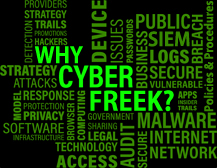When you install a home wireless or even hard wired network, there are various steps you should take to make it as safe as possible from Hackers and unwanted access.
Yahoo came up with an article recently that gives 10 ways to ensure your network is safe. This article is available by clicking this link.
The issue is that they only touch upon some of the steps and those that they do touch on, they do not go deep enough!
An Example is Number 1. They tell you to turn on WPA or WPA2 for securing your password and connection. Both WPA and WPA2 can be hacked rather easily if the pass-phrase is under 25 characters.
Most people use "Password", Password123" or something simple as the pass-phrase. Don't be afraid to make it something more complicated and taping it to your Access Point. Taping it is part of the Physical Security aspects of running your own home network. If no one has the keys to open the doors or even open windows to gain access to the house, then it is considered physically secure. If you place your wireless access point in a hidden location, it also could be considered Physically Secure. If it is, then please use more than a few characters as the secure Pass-Phrase. The larger the Pass-Phrase, the harder it is to hack and gain access to your data.
There are countless sites on the Internet that explain this and the use of Rainbow Tables. I was asked to try and hack (within an hour or 2) a wireless configuration for an access point. While that was not enough time to break the Pass-Phrase, I did however capture the encrypted word and ran some simple tests against it. I stated that the Pass-Phrase was between 8 and 12 characters in length and given 1 more hour, I would have the Pass-Phrase broken. They asked me to stop because I was successfully able to identify that the length of the Phrase was 10 characters long. This scared them. Good, it SHOULD!
These "safety tips" are meant to be a warning and suggestion towards fully securing your home Network. They never go into enough details and sometimes open you up for an attack. It's best to ask questions of an expert and not take some of these articles as defacto standards.
Enjoy and be safe!

